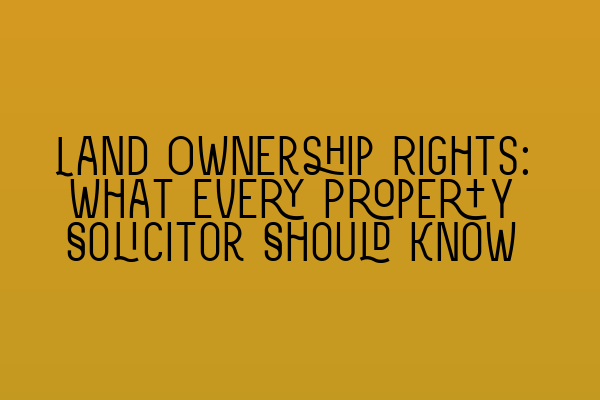Land Ownership Rights: What Every Property Solicitor Should Know
As a property solicitor, it is crucial to have a deep understanding of land ownership rights. The complexities surrounding land law can be overwhelming, but by familiarizing yourself with the key concepts and practices, you can effectively navigate through any property transaction or dispute. In this article, we will delve into the fundamental aspects of land ownership rights and provide you with invaluable insights that every property solicitor should know.
The Basics of Land Ownership
Land ownership is governed by a legal system that sets out the rights and responsibilities of individuals in relation to land. In most jurisdictions, including the United Kingdom, land ownership can be categorized into two broad categories: freehold and leasehold.
Freehold ownership grants the owner absolute ownership and control over the land. This means that the owner has the right to occupy, use, and transfer the land as they see fit, subject to any legal restrictions. Freehold ownership is often referred to as “fee simple” in legal jargon.
On the other hand, leasehold ownership entails a fixed-term interest in a property. The leaseholder has the right to use and occupy the land for the duration specified in the lease agreement. Leasehold ownership is commonly associated with properties such as flats, where multiple individuals may hold a leasehold interest in different units.
It is important to note that leasehold ownership is subject to certain obligations and restrictions, including the payment of annual ground rent, maintenance fees, and adherence to leasehold covenants. As a property solicitor, understanding the nuances of leasehold ownership is essential when dealing with leasehold enfranchisement, lease extensions, and leasehold disputes.
Registered and Unregistered Land
Another key concept in land ownership is the distinction between registered and unregistered land. The Land Registry in the United Kingdom plays a crucial role in maintaining a register of land ownership and interests, known as the Land Register. Properties that are registered with the Land Registry have their title information recorded, providing a clear and binding record of ownership.
Registered land is considered more secure and easily marketable compared to unregistered land. Prior to the advent of the Land Registry, land ownership was evidenced by a series of deeds and documents, making it more cumbersome and prone to disputes. However, there are still instances where land remains unregistered, particularly in older properties or rural areas.
As a property solicitor, it is imperative to verify the status of land ownership by conducting thorough searches with the Land Registry. This ensures that your clients have a valid and marketable title, and it allows you to address any potential issues or discrepancies before completing a transaction.
Easements and Restrictive Covenants
In addition to understanding the fundamentals of land ownership, property solicitors should be well-versed in the concept of easements and restrictive covenants. These legal rights and obligations can significantly impact a property’s value and use.
An easement is a right granted to a person to use another person’s land for a specific purpose. Common examples include rights of way, drainage rights, and rights to access utilities. Easements can be express, meaning they are explicitly granted in writing, or implied, arising from the circumstances or long-established use.
Restrictive covenants, on the other hand, are obligations or restrictions placed on a property’s use, often encompassing aesthetic considerations, noise restrictions, or limitations on alterations. Restrictive covenants are typically created through the conveyancing process and are binding on subsequent owners of the property.
As a property solicitor, it is crucial to identify any existing easements or restrictive covenants affecting a property or to create new ones when necessary. This requires a thorough review of title deeds, previous conveyances, and relevant planning permissions. Failure to consider these elements can result in legal disputes and financial liabilities for your clients.
Conclusion
Being well-versed in land ownership rights is essential for any property solicitor. By understanding the nuances of freehold and leasehold ownership, registered and unregistered land, and the implications of easements and restrictive covenants, you can provide reliable advice and effective representation for your clients.
If you are preparing for the upcoming SQE exams and want to enhance your knowledge in property law and land law, we recommend checking out our SQE 1 Preparation Courses and SQE 2 Preparation Courses. These courses are designed to provide comprehensive coverage of all the essential topics you need to know and assist you in passing the exams with flying colors.
To further supplement your preparation, you can also explore our related articles on SQE exam dates, SQE 1 practice exam questions, and SQE 1 practice mocks FLK1 FLK2 for additional resources and practice materials.
